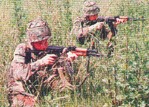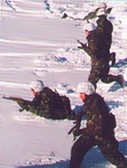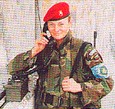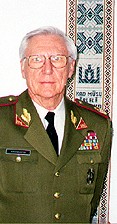The Lithuanian-born General Jonas A Kronkaitis has played a key role in Lithuania's NATO issues over the past few years. Growing up exiled from his occupied homeland, Kronkaitis became a career soldier in the US Army. In his 27 years of service, Kronkaitis held various commanding positions and also served for two years in Vietnam. He also served as the commander of the Rock Island Arsenal and was heavily involved in the development of high-tech projectiles for the military.
Kronkaitis retired from the US Army ranked colonel and subsequently worked as a senior researcher in the defence sphere. He returned to work in Lithuania in 1997, after being appointed deputy defence minister and advisor to the prime minister on security issues. Just a little over a year ago, Kronkaitis moved from the civilian to the military side of national defence, taking over as the commander of the Lithuanian Armed Forces, with a rank of Brigadier General.
Central Europe Review: I guess the most basic thing is: how smooth are things going with the building and restructuring of the military, with national defence?
Brigadier General Jonas Kronkaitis: It's getting smoother and smoother each day, I think. Initially, there was a lot of resistance to reform, which is very natural and normal - for people to resist change, because they feel there may be some very unfavourable impact on them.
But, now I think things are getting much smoother, because people have noticed that it has no unfavourable effect on them. Of course, we had quite a few people that left the service, because we just didn't need them, so they retired or they left for one reason or another. Right now I think things are going pretty smoothly.
 |
| A sharp eye on the NATO target |
This year, the budget appears to be doing a little better but not much. We're about 82 per cent, so ten per cent better than last year. But again, it doesn't look like we will get the budget that has been promised us.
So from that aspect, things have slowed down and it creates problems. We make plans, we make priorities, decisions, and when the funds don't materialise, we end up doing not the highest priority but something slightly lower.
CER: I was just going to discuss this budget problem, because again I think a lot of people are preoccupied with the two per cent of GDP allocation for defence, which is needed to "qualify" for NATO. Lots of politicians use it, because I guess it is a symbolic number. But with these cutbacks - you mention 72 per cent, this year possibly 82 per cent - this programme of raising spending to two per cent of GDP is obviously threatened. It may be on book at two per cent, but how does this affect the short and middle term development, especially since 2002 is obviously seen as an important year for Lithuania on the road to NATO.
Kronkaitis: Well, you're absolutely right that two per cent is symbolic. [But] the two per cent came about not as a result of pulling two per cent out of the air; we put together a ten-year plan. And to achieve our ten-year plan, we saw a need for certain funding, because we laid
| the Soviet facilities that we took over are outrageous; they're not fit for human habitation |
When we put the plan together, it was before the Russian financial crisis. But it showed that our economy was going to grow at about 4.5 to five per cent annually. In order to accomplish our plan, we found that we would need to get two per cent of the GDP in the year 2001.
Then, it became a sort of magic figure, a magic figure...[but still] a real figure. It's a real figure in that we need to get our armed forces to look like armed forces to make a contribution to NATO. So, whether it's 1.9 per cent or three per cent or whatever, it's a matter of what combat power we get for that money. And for us, two per cent by 2001 was the [necessary] percentage.
Other countries then started talking about two per cent. And maybe that's correct, but if you look at all the other countries in NATO, there is a range. Look at Luxembourg: I think it is about 0.7 per cent, but they don't have an army. Greece for instance, is some 4.5 per cent. Turkey is, again, around 4.2 per cent. Then you go to other countries, and you see it's about 2.3 per cent, 2.6 per cent or something like that. Each country is different. But these countries are reducing their armed forces, and we're building. We have to build facilities.
The Soviet facilities that we took over are outrageous; they're not fit for human habitation. We have to rebuild everything. Those countries in NATO don't have to do that. They have to maintain the good facilities that they have. They have weapons; we have to acquire weapons. So for us, two per cent really is a very reasonable amount [to spend] for defence.
But it did not come out of the air, it came out of our programme review, our resources management programme that we run... We have cost figures for various budgets and all that is put in. We have a target of 23,000 troops in the year 2008 - standing army - 50,000 active reserve and 15,000 volunteer forces. And then, of course, all of those people have to be housed, all of those people have to have weapons, and so forth. All of that was factored in.
So today, you have people making comments like, "Well, NATO doesn't tell you that you must spend two per cent," and that's true; NATO doesn't tell us anything. NATO says, "Do what the hell you want to. We don't even need you." But we need NATO! And for us to get into NATO, we have to build a force that will be credible.
But we're building that force for the defence of Lithuania. To avoid war, the best thing to do is to have a credible force that can integrate into NATO, then nobody will want to attack us. But if we have a weak force, somebody will attack us. If we have a credible force and if we're not in NATO, we may be able to deter them by showing the cost versus benefit of taking Lithuania over.
And we have put that plan together. We have put together a tactical concept, which would really raise the cost to any potential aggressor very, very much. NATO integration is the thing that I see which will avoid any potential war.
CER: As you know - in Estonia, especially - politicians have gravitated towards the two per cent figure without thinking very much. One of the things I have been writing a lot about, especially by looking at the Estonian military, is the personnel issue.
Kronkaitis: Well, personnel - that's the key. In Lithuania, we have focused on personnel. Personnel training, housing, living conditions, medical benefits and education of our soldiers. We have sent our people overseas, to the United States and other countries, for training.
We have reformed our military academy, and now it's in the last phase of reform. That's very important to us. We have replaced large numbers of instructors at the military academy. We put in a new rector, and we're also rebuilding the facilities. So by next year, our academy will have physical reforms, which will be good living conditions for cadets, but it will also have a new programme of instruction.
Our NCO academy right now is also going through a renovation phase. We have closed down the NCO academy so that we can rebuild it. During the rebuilding phase, we have a number of British officers here who are training our instructors so that by December we'll have all of our instructors completely retrained. They will themselves go through a programme that they will teach, and then be taught how to teach.
Although our NCO academy was in good shape; it was created by United States assistance, but our basic training was British. Now, we want British NCO, British basic training and a British military academy. At the military academy we have a British lieutenant colonel, who is working with our rector, and they're putting that programme together. The tactical instructors were trained by the British last year.
So, we have put all the emphasis on personnel, very little on hardware. [There are] certain things we are buying, such as communications equipment.
 |
| Hardware in action |
Hardware is coming from other countries, so our budget is spent here in the country. And that assists the economy; it creates jobs. The money is spent on construction, on manpower, on education, on training.
The United States this year selected three of our young men to go to military academies. Two received full scholarships, one a 50 per cent scholarship, and right now we're trying to figure out how to fund the third one. Then this year, we have three graduates from military academies coming back to Lithuania: two from the Air Force Academy and one from the Naval Academy. We have many other people who go on shorter courses, in Germany for instance, two-year commanding general staff college, and then in the United States for all types of courses. So focus is on personnel.
CER: With respect to training, for NATO purposes, a lot of people bring up issues such as English-language knowledge for cadets and soldiers, and also for staff-level officers. How are language training and other aspects of communication progressing ?
Kronkaitis: There, again, a very important question. English-language training is very important to us. We have established ten training centres, three of which were established last year, so in total now we have ten. That's coming along. We encourage our people to study English on their own. We have a law which prohibits promotion to major, lieutenant colonel, or colonel; so they must learn English.
Unfortunately, when we send people to the United States to various schools, to get English proficiency adequate for that course they also attend an English language school. And sometimes the English language school would be as long as the course that they go to, because you have to match a particular person, their skill, their language proficiency, which is very difficult. If everybody spoke English, there would be no problem, but right now, we have to match the course with the person and his English language proficiency.
So we're not doing well in that area. We should reduce the English language training in the United States to zero and just send people who already speak English; we're not there yet, but we're making progress.
CER: Another aspect of the personnel situation that is quite alarming in Estonia is conscription. In Estonia it has reached the point that the numbers - especially the incidence of evasion - are becoming a bit alarming. Every other week you hear of people extending their university studies by not passing their one final course, just to receive an exemption from service. Or you see articles in the papers about doctors being bribed. How big of a problem is that here in Lithuania?
Kronkaitis: It is a big problem, draft evasion. It's very difficult to understand why we have that,
| the military still doesn't have the respect and the reputation that it should have |
But we have a big problem with draft evasion. And draft evasion is very hard to pin down, because we have a very large number of people who don't pass the physical. Now the doctors tell me that yes, they don't qualify, that they, in fact, don't meet the standards. I don't know, maybe our standards are too high. Others are saying that that's a means of evasion through the medical process.
Again, the educational system here is very liberal, very easily available to everybody. So yes, they use that as a means to evade. That's not so bad, because then at least a person has an incentive for education.
 |
| Eager to enlist |
The girls are just the opposite. If we were to draft girls, I think that we would be over half! As I go sometimes to towns and ask the girls would they be willing to come into the army, I have never run into a girl who said, "Well, I don't know." Most of them will say, "Yes, if they would only take us."
CER: So, do you think that is possible in the foreseeable future? It is an issue in a lot of NATO armies as well, female soldiers. Is this within the realm of possibility in Lithuania?
Kronkaitis: Well, we've been discussing it, and I think it is within the realm of possibility. But we will not take them into combat units, because of the Israeli experience. Right now, about ten per cent of our military are women. Our military academy will start admitting women this fall. We will strive to assign them to non-combat positions. We have both NCOs and officers who are women, but primarily they are in administrative positions. Later on, they will be in logistics and combat service support, but not in combat units.
I don't know if the draft evasion is a problem, it's a symptom I think of a lack of respect for the military.
| Travelling to Lithuania soon? Choose Hotels Central at HotelsLithuania.com to reserve a hotel online at a great price. |
CER: Obviously, the army has cracked down on things such as bullying. Has that been a problem in the last few years, or has it been pretty much eradicated?
Kronkaitis: It's practically eradicated. We will have an incident now and again, but we're very strict. About a year ago was the last incident, maybe a little over a year ago, where we dismissed two NCOs for maltreating - beating up - a soldier. The soldier was drunk, and they just wanted to take care of him real quick - and that was the wrong thing to do.
CER: So the military has taken a no-tolerance approach?
Kronkaitis: Yes, no tolerance for abuse. And another thing we're doing, because our basic trainees are now trained based on Western leadership principles, [is that] when they're trained in the basic training centre, they do not mingle with other soldiers that have trained in battalions. They go as a company. So you don't have older and younger soldiers. Some of the older soldiers may still harbour some Soviet habits...
CER: Another important aspect is co-operation with other countries. Baltic co-operation is obviously very important, also co-operation with Poland. With Poland, as a NATO member, it is obvious the advantages, but what do you see as the advantage of Baltic military co-operation?
Kronkaitis: I think it is very important for us to co-operate. I think we have to learn to work together very closely. Of course, at the Tartu military academy [the Baltic Defence College, BALTDEFCOL] there is a good baseline to get our senior officers to get to know each other. BALTBAT [the Baltic Battalion, the joint peacekeeping battalion] was, of course, a good way, and BALTRON and BALTNET
| if one of us is attacked, there's no doubt that the other two will also be attacked |
Because if the time comes - whether we're members of NATO or we're not members of NATO - if one of us is attacked, there's no doubt that the other two will also be attacked, maybe later. So we cannot repeat the mistake of 1939-40, when we were indecisive. We didn't have close links and ties; we didn't have militaries that worked together. If the political decision is made [to follow the principle of] one for all and all for one, we, as military, would be ready to execute.
CER: Do you think your American background has helped in dealing with, for example, NATO issues in Washington, with US military attachés and generally in communicating and explaining things?
Kronkaitis: I certainly think it has helped, because no matter how good of a product you have, unless you can present it properly, nobody's going to buy it. And if you can speak the language - and when I say language, it is not just English, it has to be military language, it has to be a language of concepts, ideas, that are understandable in the West.
So if you can present all of that and it's understandable to them, they accept it. If you come in and you present maybe the same thing, but you present it in a different form, a different way, they will not understand.
Interestingly enough, about three years ago - I will not name the country - one of the members of the parliament of one country, having listened to several briefings, jokingly said to me, "We could understand you." She could not understand the others. They were speaking English, they were speaking reasonably good English, but it was not Western English. It was not the same approach to presenting.
Now, our military is presenting in the same way. I taught them how to make presentations, how to use the viewgraphs, how to organise all that, which is very common in the West. So that alone is very important. Just having that Western background is extremely important. And we have used it to our advantage.
The position that I was in before - as deputy-minister [of defence] - we have an American-Lithuanian there now, [Romas] Kilikauskas, so that's very helpful. We also have an American-Lithuanian in the NATO integration section, and that makes it much easier. When you put together something, and you put it together in a way that other people can quickly recognise, you sound much more credible.
CER: If Lithuania becomes a member of NATO, let's say in 2002, I would imagine its Russian counterparts - especially in Kaliningrad - would be most concerned, because geographically they would be surrounded by NATO members. When Strobe Talbott comes here, as well as other officials, they always stress that NATO integration is not directed at anyone, but do you see possible problems coming from Kaliningrad or Belarus, perhaps a retaliatory military build-up or transit problems?
Kronkaitis: No, I don't think so. I think that, in reality, they should feel less threatened. In reality, as far as transit, it should be even smoother. We have transit right now, and it's no problem. When we will feel secure and safe, we will have no reason to create any kind of self-protecting measures that could probably cause discomfort with Russia.

|
Our relations with Kaliningrad are very good. We were the ones that ratified a border treaty and presented it to Russia. We're saying we recognise the border, that we absolutely have no claim on Kaliningrad. There should be absolutely no reason for us to tighten anything as far as transit is concerned, as long as our laws are observed, as long as safety regulations have been observed. And we have been doing that.
I think that when we will feel more secure, I think trade will improve with Russia. I think economic development will significantly improve in Lithuania, because the investments will start to flow. And as those investments flow in here, and as our economic condition improves, it will also be beneficial to Russia. Because of our trade with Russia, we will buy more from Russia, and we will provide better products for Russia.
Right now, pragmatically, the Russians... should see benefits to them rather than any danger. This danger is blown out of proportion; they know that NATO is not a threat to Russia. By adding Lithuania, Latvia and Estonia, NATO doesn't become any more aggressive or any stronger than it was. It doesn't gain any kind of great position. But it does bring in three countries that have every right to self-defence. And Russians have agreed to that.
But our history shows that we have to be concerned. And we are concerned. Therefore, we are pushing very much for NATO.
Mel Huang, 12 June 2000
Moving on:
- Read more about Lithuania in this issue
- Archive of Mel Huang's articles in CER
- Return to CER front page




